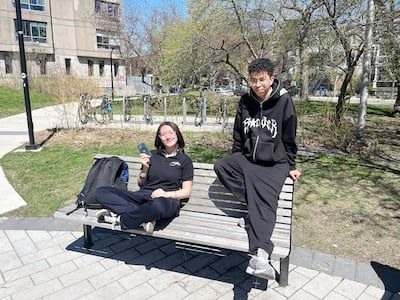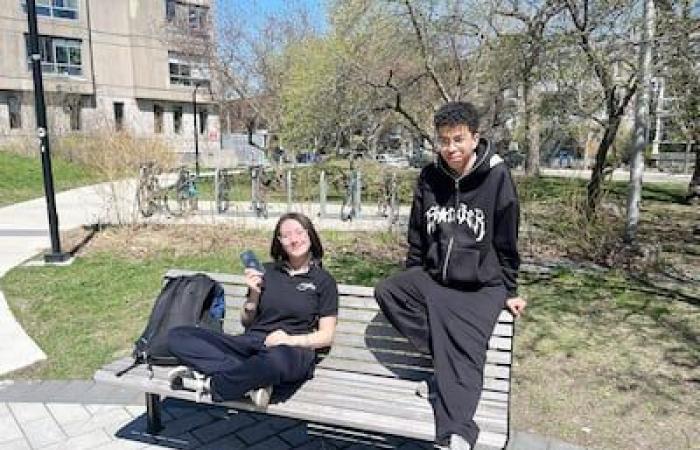The prohibition of cellular in primary and secondary schools creates a wave of dismay in several students who already have a lot of questions concerning this new measure which will come into force in the fall.
• Read also: Prohibited and vouvival cells: a “small revolution” in motion in Quebec schools
• Read also: Vouvoyer in all schools in Quebec
• Read also: The complete prohibition of cellular in schools well received in the school network
“Not having access to your cellular in class, I agree 100% with that to remain concentrated. On the other hand, it is exaggerated not to be entitled to it during the breaks, ”deplores Hiba Mchich, a 17-year-old student who studies at the Jeanne-Mance school, in Montreal.

Hiba Mchich aged 17 and his friend Ayoub Boumdi, 16, took advantage of a moment in the sun and their cellular before the implementation of a new measure which will prohibit its use in their secondary school in the fall of 2025. (May 1, 2025) (what) (or) (why). Photo Marianne Langlois Photo Marianne Langlois
As of September, all primary and secondary students will be prohibited from accessing their cellular school and several of them are worried.
“I wonder how they will manage the situation … I, in addition, I am dyslexic-dysorthography so I use my cell phone as a learning tool,” denounces Daphné Benard, a 16-year-old student.
“Often, our teachers put notes online and we have it immediately on our devices. Same thing for the Pinterest social network for example; We are inspired by our plastic art projects, ”explains Léa Madani, 17, who also goes to the Jeanne-Mance school.

From left to right Emily Azpuru, Léa Madani and Lou Dolivet, all three study at Jeanne-Mance high school in Montreal. They had a long time to say about the prohibition of cell phone at school, but also raised several questions surrounding the implementation of this new measure (May 1, 2025) Photo Marianne Langlois Photo Marianne Langlois
Many young people met by The newspaper mentioned “being disappointed” of this restrictive measure, since they also use their cell phone to plan their bus trips, to communicate with their parents or to listen to music.
“It is certain that in class, it will allow us to be better concentrated and to be more effective, but people will not be happy,” adds Lou Dolivet, also 17 years old.
Same story on the side of the Rochebelle high school, in Quebec.
“This is bad news, we’re going to be in secondary next year, we’re going to want to take photos to make memories, but we won’t be able to,” said Ariane, a student of 4e secondary who preferred to silence his last name.
For others, this is an opportunity to be more in the present moment.
“We are more with our friends, that’s for sure. When we had our Cells, as soon as we had a notification, we looked at her before spending time with our friends, “comments Jeanne, 13 years old, who also studies at the school in Rochebelle, where cellulars have been prohibited for the youngest since the start of the school year.
Impact positif
For Michel Pellerin, a replacement teacher in primary in Drummondville, this is excellent news.
“Finally! I totally agree with this measure. Personally, I already banned it in class because there are students who look at their cell phone rather than listening, ”he says.
Beyond the many positive aspects for socialization, for concentration and for mental health, the teacher in psychoeducation at the University of Montreal Linda Pagani believes that the initiative could inspire others to follow suit.
“I believe that it is an opportunity for Quebec to become a leader in the matter by demonstrating that it is possible to do it and that it brings a lot of positive,” she exclaimed.
-With Daphnée Dion-Viens
Do you have any information to communicate to us about this story?
Write us to the address or call us directly at 1 800-63SCOOP.








